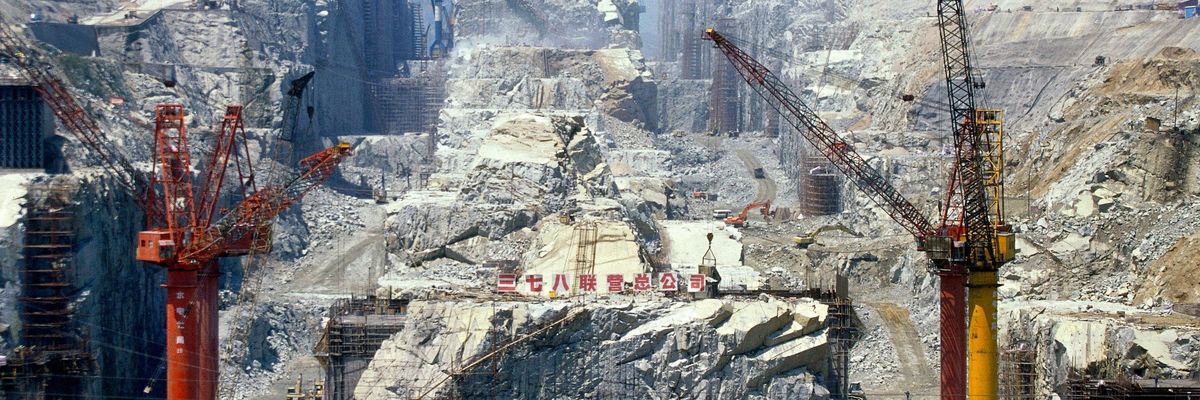As campaigners on the ground in the Scottish city of Glasgow continued to call out world leaders for delivering empty promises at COP26, hundreds of groups on Tuesday urged attendees of the United Nations climate summit to reject attempts by the hydropower industry to secure support for new projects and instead focus on real solutions to the planetary crisis.
"Instead of damming the rivers that help sustain us, climate funds should be used to restore rivers and promote protecting river ecosystems and communities."
Reiterating concerns raised around the beginning of the conference by U.N. human rights experts, a diverse coalition of 346 organizations from 78 countries issued a joint statement warning that "the hydropower industry is gearing up for a massive greenwashing effort to present its destructive product--which has been shown time and again to destroy ecosystems and communities--as the pathway out of our predicaments."
"Funding hydroelectric power construction would not only fail to prevent catastrophic climate change," the statement says, "it would also worsen the climate crisis by exploding methane emissions and diverting scarce climate funds away from meaningful energy and water solutions in a world that is already grappling with severe impacts of climate change."
"We call instead for just and sustainable solutions to the climate and biodiversity crises that recognize and support the role of natural systems and free-flowing rivers in promoting climate resiliency and mitigation and center the invaluable role of Indigenous peoples and traditional communities on the frontlines of these crises," the statement continues.
While highlighting the harms of dams--from exacerbating methane emissions and jeopardizing freshwater species to violating the human rights of impacted communities--the statement emphasizes that "free-flowing rivers and natural lakes have immense value for the welfare of the ecosystems they sustain, humankind, and survival on the planet."
The coalition calls for:
- A prohibition of funds committed under the Paris agreement for the construction of new hydropower dams;
- Countries to remove new hydropower dams from their Nationally Determined Contributions (NDCs);
- A just and sustainable energy transition and economic recovery that centers people and ecosystems;
- Investment to rapidly upscale truly renewable energy sources capable of delivering needed energy access while transitioning away from destructive fossil fuels and hydroelectric dams;
- Removal of destructive and obsolete dams that inhibit ecosystem processes (including carbon sequestration), providing additional benefits of spurring resilience and food security;
- Upgrading or refurbishing existing dams where economically feasible, not disruptive to ecosystems and river communities, and free, prior and informed consent of Indigenous peoples has been granted;
- Enhanced energy conservation and efficiency measures, along with upgrades to electrical grids to lessen the demand for energy; and
- Permanent protections that prohibit dam construction on free-flowing rivers and most vital freshwater ecosystems.
The coalition's demands come after four U.N. special rapporteurs on November 1 urged governments to ensure independent reviews of dams, implement and enforce international human rights obligations, and join with the power industry and financial institutions to halt new large hydropower projects and prioritize the optimization of existing infrastructure.
Supporters of the groups' statement echoed its main messages Tuesday.
Ecologist Philip Fearnside of Brazil's National Institute for Research in Amazonia explained that "hydropower is uniquely poorly suited to address climate change" because "dams are virtually never 'additional' (they are being built regardless of subsidies from carbon credit), they are increasingly vulnerable to climate-change-induced droughts and floods, and they are significant emitters of methane."
Fernanda Purran of the Mapuche-Pehuenche Tribe and director of Rios to Rivers Chile shared her personal experience with hydropower, saying that "I see the suffering, pain, and frustration of families who fought tirelessly to defend the BioBio River and our lands that were flooded as a result of the reservoirs."
"The dams devastated our lands, forests, rivers, and culture," she continued. "The place where our families gathered, lived and were buried was flooded. I dream of children living without repression, who can enjoy free-flowing rivers and everything that the Mapu (Earth) and our ancestors have given us to live."
Related Content
Over 700 Groups Demand 'Real Climate Solutions, Not Net-Zero Promises'
Jessica Corbett
Siziwe Mota, Africa director of International Rivers, said that "as the world confronts the climate crisis, mass biodiversity loss, water scarcity, and the pandemic, we need to move beyond business-as-usual approaches like hydropower to deliver real solutions."
While COP26 organizers and participants debating the world's plans to address the climate emergency have come under fire for the exclusionary nature of this year's summit, dam opponents say it's a very familiar dynamic for those most impacted to be left out of the negotiating process.
"You seldom see us on the world stages or in key decision-making arenas despite our roles in protecting the remaining biodiversity and having stopped and delayed greenhouse gas pollution equivalent to at least one-quarter of annual U.S. and Canadian emissions," Paul Robert Wolf Wilson, a Klamath Tribes member and chief storyteller for Rios to River, said Tuesday.
Chris Wilke, global advocacy manager for Waterkeeper Alliance, declared that "instead of damming the rivers that help sustain us, climate funds should be used to restore rivers and promote protecting river ecosystems and communities."





